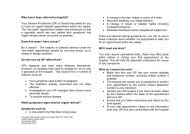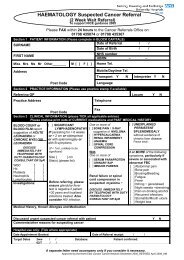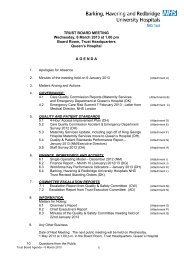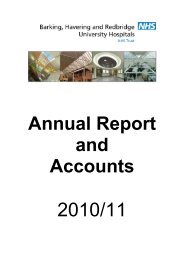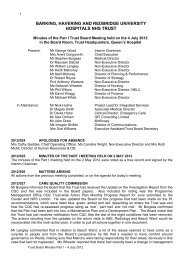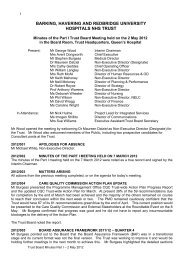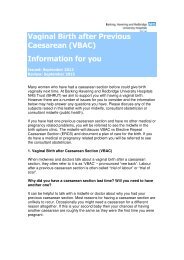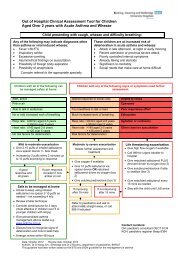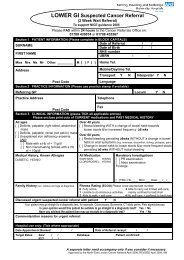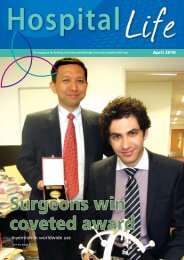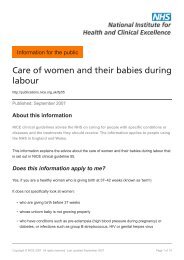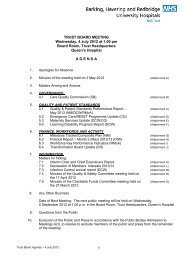Trust Board papers November 2012 - Barking Havering and ...
Trust Board papers November 2012 - Barking Havering and ...
Trust Board papers November 2012 - Barking Havering and ...
Create successful ePaper yourself
Turn your PDF publications into a flip-book with our unique Google optimized e-Paper software.
There are three key components underpinning this strategy:<br />
• The <strong>Trust</strong> Information Governance Framework, which provides a<br />
summary/overview of how the <strong>Trust</strong> is addressing the IG agenda<br />
• The <strong>Trust</strong> Information Governance Policy, which outlines the objectives for<br />
Information Governance; <strong>and</strong><br />
• The annual action plan arising from a baseline assessment against the st<strong>and</strong>ards<br />
set out in the NHS Connecting for Health Information Governance Toolkit<br />
4. To ensure there is a management structure to reflect IG requirements<br />
Within the <strong>Trust</strong>, the Chief Executive Officer (CEO) has overall responsibility for<br />
Information Governance (IG), this responsibility is discharged through the Executive<br />
Chief Information Officer (from 3 rd December <strong>2012</strong>). This individual is responsible for all<br />
aspects of IG including the submission of the Connecting for Health’s Information<br />
Governance Toolkit, is the chair of the Information Governance Steering Group (IGSG),<br />
as well as being the <strong>Trust</strong>’s Senior Information Risk Officer (SIRO).<br />
The SIRO is responsible for underst<strong>and</strong>ing how the strategic business goals of the<br />
<strong>Trust</strong> may be impacted by information risks <strong>and</strong> for the ongoing development <strong>and</strong> dayto-day<br />
management of the <strong>Trust</strong>’s Risk Management Programme for information privacy<br />
<strong>and</strong> security. The SIRO will review <strong>and</strong> agree action in respect of identified information<br />
risks, ensure that the <strong>Trust</strong>’s approach to information risk is effective in terms of<br />
resource, commitment <strong>and</strong> execution <strong>and</strong> that this is communicated to all staff. In<br />
addition they will provide a focal point of resolution <strong>and</strong>/or discussion of information risk<br />
issues, <strong>and</strong> ensure the <strong>Board</strong> is adequately briefed on information risks.<br />
The IGSG comprises of senior representatives from across the <strong>Trust</strong> <strong>and</strong> its<br />
professional disciplines, to promote a holistic approach to IG. It has overall<br />
responsibility for overseeing the implementation of the Information Governance<br />
Strategy, Framework, IG Policy <strong>and</strong> any IG actions plans, by embedding IG within the<br />
organisational structure, <strong>and</strong> sharing the responsibility for completion of the annual IG<br />
Toolkit assessments. It is therefore vital to the development of best practices which are<br />
acceptable, practicable, ‘owned’ <strong>and</strong> therefore better supported across the whole <strong>Trust</strong>,<br />
<strong>and</strong> influences the integration <strong>and</strong> inclusion of IG st<strong>and</strong>ards with other governance,<br />
strategies, work programmes <strong>and</strong> projects, e.g. IT programmes.<br />
The IGSG is accountable to the <strong>Trust</strong> <strong>Board</strong> through the Executive Chief Information<br />
Officer, the named Director on the <strong>Board</strong> with responsibility for Information Governance<br />
(IG). This post is supported by the Director of Clinical Strategy who is the <strong>Trust</strong>’s<br />
Caldicott Guardian, the Head of Commissioning, Information <strong>and</strong> Planning, the IG Lead<br />
<strong>and</strong> members of the IGSG. The IGSG is a sub-group of the Quality <strong>and</strong> Safety<br />
Committee. Terms of Reference <strong>and</strong> membership of the IGSG are defined in the <strong>Trust</strong><br />
document, ‘Information Governance Steering Group Terms of Reference’.<br />
Developing an IG culture within the <strong>Trust</strong> will be achieved through IG training being<br />
provided as part of the <strong>Trust</strong>’s m<strong>and</strong>atory corporate induction programme for new<br />
<strong>Barking</strong>, <strong>Havering</strong> & Redbridge University Hospitals NHS <strong>Trust</strong> Page 4 of 9<br />
Information Governance Strategy Version 1.3 Issued August <strong>2012</strong>



![[4] Biopsy Leaflet.pub - Barking, Havering and Redbridge University ...](https://img.yumpu.com/51285530/1/190x134/4-biopsy-leafletpub-barking-havering-and-redbridge-university-.jpg?quality=85)
